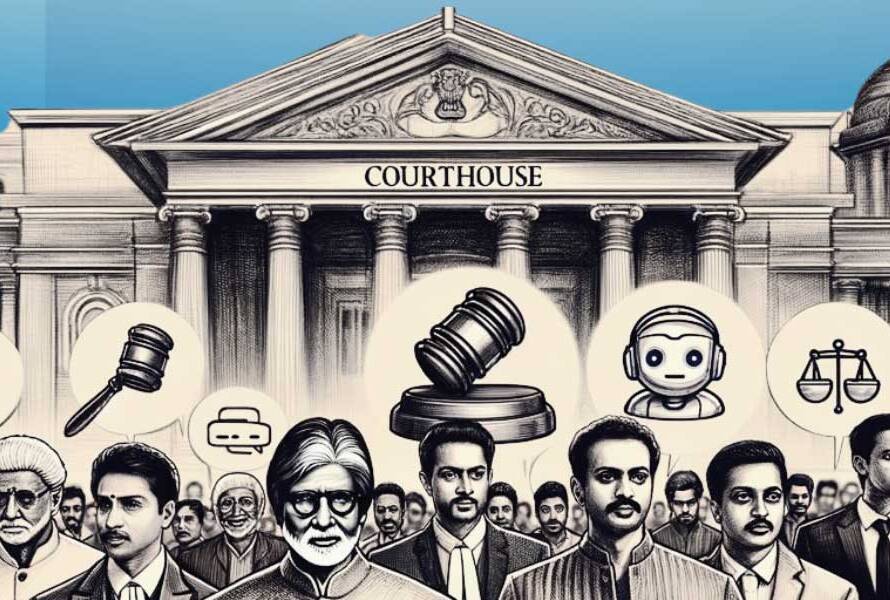Cinematographic (Certification) Rules, 2024
By Amal Goenka, Associate Partner and Hitakshi Chotaliya, Senior Associate
Ministry of Information and Broadcasting has issued a public notice dated February 09, 2024 inviting comments and suggestions from the industry stakeholders on the draft of Cinematographic (Certification) Rules, 2024. In furtherance of above public notice, the Ministry of Information and Broadcasting, on 15th March 2024, has notified the Cinematographic (Certification) Rules, 2024 (“Amendment Rules”). The Amendment Rules comes in light of the amendment made to Cinematographic (Certification) Act, 1984 via the recent Cinematographic (Amendment) Act, 2023 (“Amendment Act”) as notified on 04th August 2023. The Amendment Rules seeks to change various key rules under the existing Cinematographic (Certification) Rules, 1983 (“Existing Rules”) including but not limited to implementation of the online ‘e-cinepramaan portal’, revised classification of films, revised age-based rating system for films and fees for examination of films by the Board of Film Certification (“Board”). The changes proposed under the Amendment Rules are largely in terms of aligning the rules with the amendments made via Amendment Act.Summary of Amendment Rules
- Definitions:
- “Long Film” would mean a film running 72 (seventy-two) minutes or more, including the credit and title time of film; and
- “Short Film” would mean a film running less than 72 (seventy-two) minutes.
- Further, the definition of “chairman” of the board has been replaced with the “chairperson”.
- Lastly, new definitions have been added under Rule 2 of Amendment Rules as below:
- “foreign films” means films produced outside India.
- “UA certificate” means ‘UA certificate with the appropriate ‘UA marker’, as defined under clause (i) of section 2 of the Cinematographic Act, 1952.
- “UA marker” means age-based sub-categories of the ‘UA’ certificate, namely, “UA 7+” OR “UA 13+” or “UA 16+”.It seems like that the definition of “imported” under Existing Rules is intended to be replaced with “foreign film”. Further, the addition of “UA certificate” and “UA marker” definitions come as a result of new age rating system for U/A films as introduced under Amendment Act.
- Term of Office with respect to the Members of the Board:
- Under Amendment Rules, term of office of other members of the Board shall continue to hold office even after the expiry of their term of a period not exceeding 3 (three) years until a new member is appointed in their place. Provided further that the term of the members shall be discontinued in the sequence of their appointment.
- Further, Rule 4 has been modified where the Central Government may take steps as it thinks fit to appoint women members in the Board so that there is due representation of women, where it is proposed that at least one-third of the members in the Board shall be women with the intention to make it preferably half.
- Members of advisory panel:
- Rule 9: Under Amendment Rules, term of office of members of advisory panel has been increased to 3 (three) years from 2 (two) years.
- The members of advisory panel are entitled to travelling and daily allowances for journeys performed by them for attending the meeting outside headquarters or for the purpose of discharging duties. Under the Existing Rules, these allowances were to be paid on the scale provided under Fundamental and Supplementary Rules, 1922 applicable to First Grade officers to Central Government. Under the Amendment Rules, the allowances to be paid under this rule are made subject to prior approval of Chairperson.
- Online application for examination of film:
- Examining Committee:
- The Amendment Rules proposes to add sub-rule 3 under Rule 23 of Existing Rules as below:The Regional Officer may invite such subject or language experts in the field of film as it may consider appropriate, for the examination of a film by the Examining Committee. Provided that the expert invitees who attend the meetings of the Examining Committee shall be paid such fees and allowances as may be prescribed by the Central Government. Provided further that where such an expert has not been invited for the initial screening, if the Examining Committee decides that the film is required to be seen by such expert, the screening may be done again by the Board, without any cost to the applicantThe above insertion would be helpful in cases where committee is required to examine the film which may be based on particular subject matters for e.g.: scientific films, research films, educational films etc. Inviting any such subject or language experts will aid in providing better understanding and clarity on the subject matter and nitty gritty of film and for committee to take an informed decision about making any edits/alterations in the film prior to issuance of certificate.
- Further, the Amendment Rules proposes to add sub-clause (b) to sub-rule 3 under Rule 22 of Existing Rules (sub-clause (b) to sub-rule (4) under Rule 23 of Amendment Rules), wherein the applicant shall also be required to ensure that the film which is submitted for examination includes title, castings and credits displayed in the language of film and in any other language as may be desired by applicant. Earlier, the only requirement was to submit the film in its final form with background music and all sound effects duly recorded on film itself.
- Lastly, in view of the new age-based rating introduced by Amendment Act, the Amendment Rules seeks to make consequential changes in sub-rule 9(b) of Rule 22 of Existing Rules. The revised rule requires that the examining committee, after viewing the film, should record in writing, that whether the film is suitable for unrestricted public exhibition with an endorsement of caution that whether a child below the age of 7 years, 13 years or 16 years may be allowed to see the film should be considered by parents or guardian of such child with respect to appropriate UA with UA marker certificate.The above change in the rating system was the need of the hour. With the advent of technology, the use of phones and internet has become so hassle free that a child can grab access to any type of content very easily. The aforesaid age-based rating system would definitely help parents/guidance of the aforesaid age groups to make more informed decisions about the content which is being viewed by their child.Last year, I&B Ministry had asked OTT platforms to display a similar age-based classification, as mentioned in foregoing para, for the content displayed/exhibited on the OTT platforms and now having similar age-based rating system for films meant for theatrical release shows Ministry’s effort to maintain parity between content streaming directly on OTT and films made for theatrical exhibition.
- Validity of certificate:
- Alteration of film after issue of certificate:
- Under the Existing Rule, it has been stated that when a film is altered by excision, colouring or otherwise post receiving certificate, then it shall not be exhibited unless the portion/s excised, coloured or otherwise altered have been reported to Board and Board has endorsed the alterations in certificate.The scope of sub above rule has been widened via Amendment Rules (Rule 31) to also include any addition of subtitles, audio descriptions or closed captions in languages other than original language of film or any other accessibility measures as notified by Central Government from time to time.
- Further, the Amendment Rules also adds a proviso to above rule stating that any of excisions, additions, colouring or other alterations reported to Board for endorsement should confirm with the category of film certified under Rule 27.The above change is in line with the Ministry of Information and Broadcasting directive dated 01st October 2019 to producers and CBFC wherein it had requested to motivate and persuade CBFC’s associated members to make audio description and closed captioning as a part of the production and distribution of a film itself.
- Fees:
- The Amendment Rules proposes to completely overhaul the table of fees under Existing Rules. Under the Existing Rules, the fee to be charged for examination of fee is linked to length of film in metres with an upper cap. For e.g.: Rs 20 per 300 metres where the film does not exceed 600 metres in length. However, the Amendment Rules links the amount of fee directly to the duration of the film and the category of the film i.e. (i) films other than pre-dominantly educational films and (ii) pre-dominantly educational films.While linking the fee directly to duration and category of the film (as provided above) provides clearer approach to calculate the applicable charges, it remains to see that how producers are reacting to the amounts/charges specified in Amendment Rules. If there is an excessive increase in rates between Existing Rules and Amendment Rules, then the stakeholders may seek appropriate reasoning from ministry on the proposed revised fee structure
- Further, a new sub-clause has been added for priority scheme. The Amendment Rules adds sub clause (2) under clause 33 wherein application under priority scheme may be made upon payment of 3 times the fee payable for examination of fee, for scheduling the examination of film preferably within 5 days, subject to available slots.Under the Existing Rule, there is no such provision for priority scheme. While adding the above sub-rule may be helpful for producers who may want to fast track the certification process by paying the extra fees, it should also be ensured that the producers who have applied outside the priority scheme, are also given equal preference and timely response in terms of entertaining and disposing their application.
- Time limit for certification of film:
Other miscellaneous changes:
Few other changes proposed to be made vide Amendment Rules are as follows:- Under the Amendment Act, the wide revisional powers given to Central Government under Section 6 of the Cinematographic (Certification) Act, 1984 were withdrawn. The Amendment Rules proposes to align the rules with Amendment Act and accordingly powers given to Central Government under Rule 31 (Uncertification of a film) and Rule 32 (Re-examination of certified films) under the Existing Rules have been removed by Amendment Rules.
- The introduction of online portal has led to abolishment of all dated provisions relating to sending communications to committee members/applicants via registered posts, submitting hard copies of scripts and maintenance of records under registers. Under the Amendment Rules, all communications to committee members/applicants shall be sent via electronic form and all records shall be maintained in electronic form. Further, the payment of fees, uploading film and script shall also be made on e-cinepramaan portal.
- Further, the Amendment Rules also amends certain timelines under Rule 41 of Existing Rules (Time limit in relation to certification of films) as below:
- Once the script or authentic sources are submitted by applicant, the examining officer shall scrutinise the same and submit the final report of examining committee to Chairperson within 5 days from receipt of script or authentic sources. Under the Existing Rules, the timeline is 10 days.
- The timeline for applicant to submit his reply once he has received communication has been reduced to 5 (five) working days from 14 days, as given under Existing Rules. The reason behind this change is unknown however the change should made be effective only after understanding view points and concerns of applicants who may actually know the time period required for sending responses.




